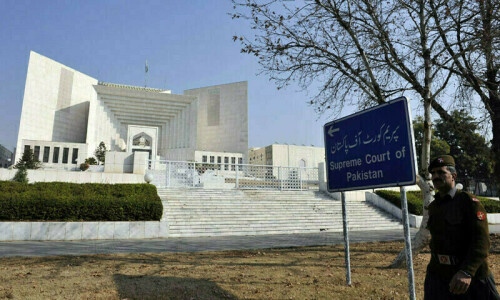The chairman of the Securities and Exchange Commission of Pakistan (SECP), Zafar Hijazi, was taken into custody by the Federal Investigation Agency (FIA) on Friday.
This was after a three-judge bench of the Supreme Court on July 9 ordered the registration of a criminal case against the apex regulator as the court found him guilty of tampering with the record of Chaudhry Sugar Mills.
At the SECP offices in Islamabad, there is a deafening silence.
“Embroiled in its own troubles, how will the regulator regulate the regulatees?”
But people familiar with the affair contend that with the detention of Mr Hijazi, there seems to be chaos all around.
Reports suggested that the open confrontation between the top and middle management had turned further nasty.
Commissioners and executives approached by this writer until last Friday either switched off their mobiles or declined to answer queries.
But investors at the equity market have little interest in the fate of the SECP chairman. They have bigger worries on their minds.
“Embroiled in its own troubles, how will the apex regulator regulate the regulatees,” asked a high-net-worth individual.
The Pakistan Stock Exchange (PSX) has already lost 17pc of its value since the peak on May 24 due to ‘political uncertainty’.
Foreign outflows continue to drain the market of liquidity with individual and institutional investors resorting to profit taking, or watching from the sidelines, and the KSE-100 index continues to extend its decline by the day.
A permanent managing director of the PSX — the frontline regulator — is still to be appointed following the retirement of Nadeem Naqvi on June 30.
Under the circumstances, the worries of investors of a major fall at the market as the rudderless boat of the PSX sails on its own appear all but genuine.
Mr Hijazi denies any wrongdoing and continued to hold office until he was escorted by the FIA from the court to the Pakistan Institute of Medical Sciences (PIMS). Reports suggested that soon after the court order on July 9, Mr Hijazi headed straight for the SECP offices and reminded everyone that he still was the boss.
There is no evidence to suggest that he has been fired from the job and it was something to that effect he said when this writer called Mr Hijazi last Wednesday.
A day later, the SECP chief had chaired a meeting of stakeholders in Karachi and recounted the several objectives achieved during his term, which included the integration of three stock exchanges, divestment of the PSX to the Chinese investors, inclusion in the MSCI emerging-market index and the self-listing of the PSX.
But corporates are generally unhappy with the working style of the SECP chairman. No one wanted to go on record but several company heads fumed: “The market was never burdened with such a stockpile of new regulations. How can a company concentrate on its business if the regulator is constantly breathing down their neck?”
He underscored the corporate sector’s long-held point of view that ‘over-regulation’ was worst than ‘under-regulation’.
A market participant reminded that although the upper house of parliament had rejected the recently enacted ‘Companies Act, 2018’ as it fell short of adequate discussions with the stakeholders, Finance Minister Ishaq Dar stepped in and secured its approval from the joint session of parliament.
The secretaries at corporates who reserve a separate room for storage of regulatory filings of quarterly, half-yearly and annual documents and the plethora of other documents required under the much-criticised ‘code of corporate governance’, still live in dread of the arrival of a new show-cause notice from Islamabad.
The notices arrived on one pretext or the other as the over-vigilant compliance department searched for an excuse to harass the companies, said a secretary of a major insurance company.
The SECP’s enforcement division during the past years has held strict regulatory oversight.
Eleven criminal complaints were filed by the division during June 1, 2016 to June 30, 2017 with reference to the market abuses that included price manipulation and insider trading.
Hearing notices were issued to various securities brokers wherein licences of 36 stockbrokers were cancelled and more than 1,000 show-cause notices, orders and compliance directives were issued to brokers, beneficial owners of listed companies and accountancy firms for non-compliance with the regulatory framework during the period.
The buying of shares on borrowed money — leverage or “badla” — has played a role in most market turmoils since 2001 and was one of the major causes of the market crash of 2008 that inflicted over $13 billion losses on small investors.
The crash led to the ban of ‘badla’, but the practice did not quite disappear, and a modified form of the old system — the ‘in-house badla’ — continued to exist.
Investors dealing with brokerage houses that provided ‘in-house badla’ were at risk, for, in case the broker went deep in financial distress, many brokers quietly sold off unsuspecting clients’ shares and took flight carrying with them billions in cash.
Ignoring the lament of stockbrokers that volumes would disappear, the SECP came down with a heavy hand on brokers to crush the practice of ‘in-house’ badla.
Show-cause notices were issued to dozens of suspected errant brokers, the regulators’ team of monitors cracked down on suspected brokers, which all but cleansed the market of in-house badla.
Many of its worst opponents admit that this one step by the SECP has staved off a market crash, which was eminent in the turmoil that began at the start of the current calendar year, mainly on political ‘uncertainty’.
Published in Dawn, The Business and Finance Weekly, July 24th, 2017














































